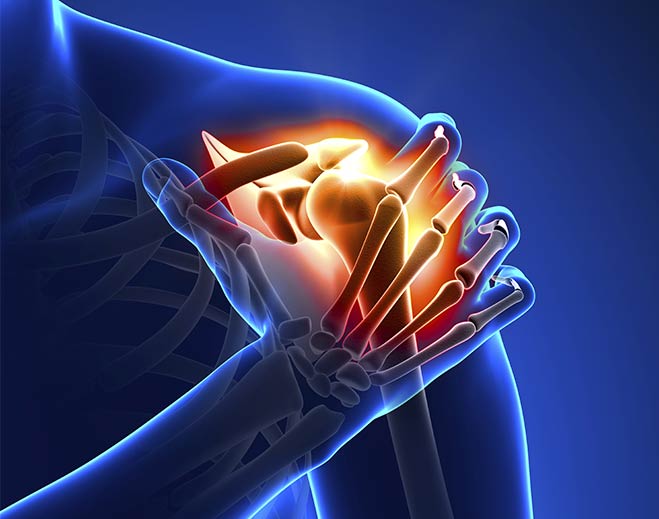The constant use of the lower extremities makes them an easy target for injury and pain, specifically in the knees. Walking, sitting and standing all put pressure on our knees, while most athletic activities rely on them as well. Knee pain is a common ailment that affects thousands of people in the US each year.
Anterior Cruciate Ligament Injury
The ACL (anterior cruciate ligament) is one of the most commonly injured ligaments in the knee. Running diagonally through the middle of the joint, the ACL works together with three other ligaments to connect the femur (upper leg bone) to the tibia (lower leg bone). ACL injuries occur most often in athletes as a result of a sudden deceleration, pivot and twist on the leg, direct contact, landing awkwardly after a fall, or playing recklessly. About half of ACL injuries are also accompanied by damage to the meniscus, cartilage, bone or other ligaments in the knee.
Signs that you may have injured your ACL include pain, swelling and instability immediately after the injury, followed hours later by greater swelling and pain, limited motion, tenderness and an inability to walk comfortably. While not all ACL injuries will require surgery, leaving the ligament torn or damaged puts the patient at risk for recurring episodes of knee instability. In many cases, patients will not be able to resume high-level athletic activity without surgery.
Your doctor will discuss with you whether or not surgery is recommended after a thorough evaluation of your condition, as well as consideration of your age, activity level, and overall health. The details, risks and benefits of surgery, as well as the different surgical options, will be discussed during a pre-surgical consultation.
Anterior Cruciate Repair
The ACL (anterior cruciate ligament) is one of the most commonly injured ligaments in the knee. Running diagonally through the middle of the joint, the ACL works together with three other ligaments to connect the femur (upper leg bone) to the tibia (lower leg bone). ACL injuries occur most often in athletes as a result of direct contact, landing awkwardly after a fall or playing recklessly. About half of ACL injuries are also accompanied by damage to the meniscus, cartilage, bone or other ligaments in the knee.
Signs that you may have injured your ACL include pain, swelling and instability immediately after the injury, followed hours later by greater swelling and pain, limited motion, tenderness and an inability to walk comfortably. While not all ACL injuries will require surgery, leaving the ligament torn or damaged puts the patient at risk for recurring episodes of knee instability. In many cases, patients will not be able to resume high-level athletic activity without surgery.
Your doctor will determine whether or not surgery is recommended for you after a thorough evaluation of your condition, as well as consideration of your age, activity level and overall health. The details, risks and benefits of surgery, as well as the different surgical options, will be discussed during a pre-surgical consultation.
Knee Arthroscopy
Arthroscopy is a minimally invasive procedure that allows doctors to examine tissues inside the knee. During an arthroscopic procedure, a thin fiberoptic light, magnifying lens and tiny television camera are inserted into the knee, allowing your doctor to examine the joint in great detail. For some patients, it is then possible to treat the problem using a few additional instruments inserted through small incisions around the joint. Sports injuries are often treatable with arthroscopy. Knee injuries that are frequently treated using arthroscopic techniques include meniscal tears, mild arthritis, loose bone or cartilage, ACL and PCL tears, synovitis (swelling of the joint lining) and patellar (knee cap) misalignment. Because it is minimally invasive, arthroscopy offers the patient many benefits over traditional surgery. These include:
- No cutting of muscles or tendons
- Less bleeding during surgery
- Less scarring
- Smaller incisions
- Faster recovery and return to regular activities
- Faster and more comfortable rehabilitation
Bursitis
Our joints contain small, slippery sacs called bursae that help muscles and tendons slide smoothly over our bones. Bursitis is the inflammation (swelling) of one of these sacs. Overuse or constant pressure on the knee causes the bursa to fill with fluid. It then becomes irritated, gritty and rough, and can create friction in other parts of the joint as it swells.
Two common sites for bursitis in the knee are the kneecap (prepatellar bursitis) and the pes anserine (“goosefoot”) bursa, located about two inches below the knee where the shinbone meets three tendons from the hamstrings. Pes anserine bursitis often afflicts runners and other athletes as well as people with osteoarthritis (“wear and tear” arthritis), tight hamstrings, obesity, or turned-out knees or lower legs. Symptoms include pain on the inside of the knee or at the top of the shinbone that gets worse with exercise or stair-climbing. Prepatellar bursitis tends to occur in people whose jobs involve long periods of kneeling, who play sports that frequently involve falling or being struck on the knee, who have been in a car accident, or who have rheumatoid arthritis or gout. Symptoms include pain after activity and swelling and tenderness on the kneecap.







